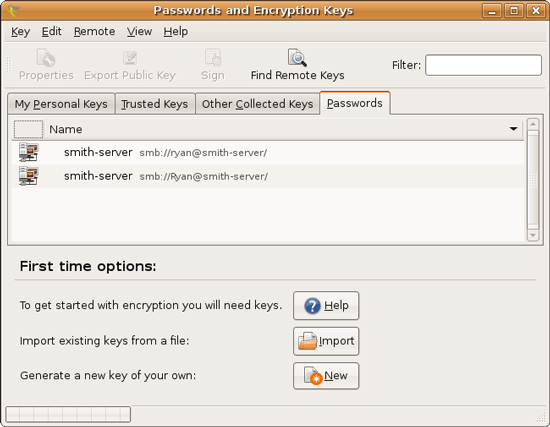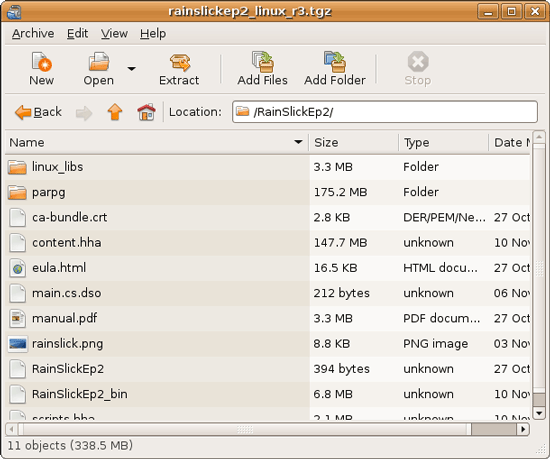Revisiting Linux Part 1: A Look at Ubuntu 8.04
by Ryan Smith on August 26, 2009 12:00 AM EST- Posted in
- Linux
Things That Went Right
On the flip side of the things that went wrong, we have the things that went right. Most of the Ubuntu experience went right and has been covered previously, so this is going to be a catch-all for other things about Ubuntu that impressed me, but don’t necessarily fit anywhere else.
One of the nicer features of Mac OS X that you don’t see mentioned very much is the Keychain, a credential management framework for applications to use to securely store passwords and the like. Such systems aren’t rare – even Windows has something similar through its Credentials Manager – but Mac OS X is unique in that its implementation at least gets used, at times.
I had not been expecting something similar in Ubuntu, so it caught my eye when a Mac OS-like password box came up when I was logging in to my file server. As it turns out Ubuntu has similar functionality through the Passwords and Encryption Keys application. And since Ubuntu heavily uses the GNOME desktop environment that this application is a part of, a number of its applications are built against the keyring and use it.

It’s not quite as tightly woven as Keychain is under Mac OS X, but it’s better utilized than Windows and used enough that it makes sense to visit the keyring application. The biggest holdout with a stock install is Firefox, which uses its own password manager regardless of what platform it’s on.
Another thing that caught my eye was Ubuntu’s archive manager, called File Roller here. As we’ve lamented many, many times before, Windows’ archive management abilities are terrible. Files are slow to compress, files are slow to uncompress, and just supporting Zip files isn’t quite enough. Mac OS X does a bit better by being faster, but it also has absolutely no support for browsing Zip archives, it just packs and unpacks them. Most power users I know will have something like WinRAR or BetterZip installed to get a proper archive browser and wider archive support.
File Roller is a complete archive manager, and it supports slightly more exotic archive formats like RAR along with the customary Zip and *nix standard of GZip. The biggest knock against it when it comes to archive formats is that it can read more than it can write, RAR again being the example here.

This also brings up an interesting quirk with archives under *nix that you don’t see under Windows. The Zip format specifies it as being both a container for multiple files and a compressor for those files. GZip on the other hand can only compress a single file – so when it comes time to compress multiple files, they must first be packed in a compressionless tarball (TAR), and then the tarball is compressed, resulting in .tar.gz. The quirk is that the Zip format compresses each file separately, while .tar.gz by its very nature compresses all the files together at once; this is commonly known as solid archiving.
Depending on the files being compressed, solid archives can have significant space advantages over individually compressed files by taking advantage of redundancy between the files themselves, and not just the redundancy in individual files. This is also why WinRAR is so common on Windows machines, since the RAR format supports solid and individual archiving.
Now the downside to solid archiving is that it takes longer to pull a file out of a solid archive than an individually compressed archive, since everything ahead of the file must be decompressed first in order to retrieve the data needed to recreate the desired file. So solid archiving isn’t necessarily the best way to go.
Ultimately with the wider support for archive formats under Ubuntu, in some situations it can achieve much better compression ratios than what can be done under Windows. Windows isn’t entirely helpless since when it comes to installers they can use MSI installers (which use solid compression), but as far as plain archives are concerned the only built-in option is individual archiving. It’s a small benefit that can pay out nicely from time to time for Ubuntu.










195 Comments
View All Comments
Telkwa - Wednesday, August 26, 2009 - link
Nobody's going to agree with the entire article. I'm just glad to see Anandtech paying some attention, and would welcome any articles, tests, reviews, etc.It's embarrassing to visit the "Linux" tab and see the latest article was posted in July of 2005...
Geraldo8022 - Wednesday, August 26, 2009 - link
This is based on Ubuntu and I installed it this past weekend. I am having certain issues with it. Yes, it is free. Overall I like it very much and am pleasantly surprised. But, this has shown that Windows 7 will be a comparative bargain to me. I do not have the time to sit in front of the computer and play with Linux; trying to find out why certain videos don't play and why I am having eye strain and clicking on an audio link that doesn't play and a few more. When I go to the Mint forums I am confronted with a Tower of Babel what with all of the acronyms, and told to go to the terminal and type $surun%(8#**#. Ok, now turn your head and cough.I'll keep Linux on this machine to boot up and play with now and then. It beats solitaire for the time being.
VooDooAddict - Friday, August 28, 2009 - link
You hit on a good point. People I've setup with dual booting linux distros and windows begin to appreciate what they are paying for with windows. Typical response is "This is cool (Ubuntu) and I can see why some people like it. But I'm going to stick with windows, it's worth the money to me."They appreciate that Linux could work, but see the "value" in paying form something familiar.
VooDooAddict - Friday, August 28, 2009 - link
I run Vista on my main PC. Vista on all the spare LAN gaming PCs. I have an Ubuntu 9.04 VM and Ubuntu Netbook Edition on my old tablet PC (small and netbook like).Locutus465 - Wednesday, August 26, 2009 - link
Just out of curiosity what user mode were you having guests run in? Even in vista I don't provide anything greater than standard user. With that guests need my password (which they don't have) to mess my machine up. Going back as far as Windows 2000, as long as you pair Windows with good spyware (spybot, or for XP defender if you choose) and antivirus (I like Avast and AVG both free and have nil footprints) you basically don't have to worry about system security as long as the person is running a standard user account.My my parents system, we went from having to wipe and reinstall windows every time I came home from college, to a rock solid system that absoultly never failed when I performed these steps. I still like the XP/2000 behaviour of simply denying access better than the current UAC implementation. But Vista 64 + UAC (active) seems to be secure enough, particularly when paired with the aformentioned anti-virus software.
Ryan Smith - Wednesday, August 26, 2009 - link
For what it's worth, it's an admin account. I know, I know, I could do Limited User. But that tends to just elicit complaints. XP's Limited User mode is embarrassing compared to how well Vista/Win7 does it.Since it's basically just a web browsing laptop anyhow, it's basically a perfect fit for Ubuntu since I wouldn't need to be concerned with Windows malware period.
leexgx - Wednesday, August 26, 2009 - link
i have to agree even XP in its standered/limited user account mode quite hard for stuff to install but not imposable (Vista and win7 with UAC on and an standered account with the admin account passworded should prevent the system from been messed up)aguilpa1 - Wednesday, August 26, 2009 - link
It seems the OS does not like core 2 duos and nvidia 9800GTX graphics, something even OSX was able to handle.samspqr - Wednesday, August 26, 2009 - link
* for me, the best possible way to install applications on any OS, but specially in one that is free (libre) is as follows: you search on the internet for the best program to meet your needs, you find it, you copy some code that identifies it, and paste that in your package manager, which then connects to some database, checks that the program is not malware, looks for the latest version, and proceeds to download and install it, not caring whether it's open source or not; this would beat windows/OSX by a wide margin, and also the current ubuntu system, whose "we don't like this software, on philosophical grounds, so it's going to be a pain in the ass for you to install it" attitude is a bit too problematic* it would be nice if the "auto" option in the installer told you what it's going to do with your hard disk before going on to do it; I never use it, out of fear it might try to do something I don't like
* I missed some comment on that section on how Photoshop CS3 costs a lot of $$$, while GIMP is free
* along these lines, the comparison of total costs in time and money of installing windows/OSX/ubuntu, with all their companion programs, is striking
samspqr - Wednesday, August 26, 2009 - link
and about openoffice:* I didn't check this ltely, but aren't there still problems with VBA compatibility? if I can open my xls/xlsm files but I can't run my macros, it's no good; I have a ton of stuff written in VBA, and I'm definitely not doing all that work again
* the ribbon UI in office 2007 is a royal pain: it's only good for the "It looks like you're writing a letter" users, and you can't get rid of it; there's a lot of people doing real work on excel, and none I talked to likes that ribbon thing, they'd all rather stay with excel 2003